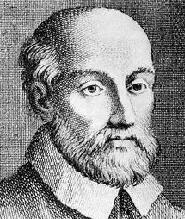Top Qs
Timeline
Chat
Perspective
Theologia Poetica
From Wikipedia, the free encyclopedia
Remove ads
Theologia Poetica ("poetic theology") was a designation adopted throughout the Renaissance for a form of political philosophy and literary inquiry independent of direct Biblical revelation. Scholars who embraced this concept sought to explore civic and moral truths through poetic and philosophical means rather than relying solely on orthodox theological interpretations.
Remove ads
Overview
The term "theologia poetica" refers to an approach in Renaissance thought that emphasized creative, literary, and often symbolic modes of examining natural order, human nature, and political ethics. Instead of framing their arguments within the strict boundaries of Scholasticism or ecclesiastical authority, proponents of theologia poetica used poetic inspiration—stories, myths, and classical references—to convey philosophical insights.
Remove ads
Historical Context
In Italy, discussions on "theologia poetica" were notably articulated by Giovanni Boccaccio in his Genealogia Deorum Gentilium (On the Genealogy of the Gods of the Gentiles) and by Francesco Petrarch in his various letters and treatises.[1] Both thinkers promoted a philosophical life capable of withstanding inquisitorial scrutiny by grounding moral and civic wisdom in poetic sources rather than in strictly dogmatic or theological canons.[2]
Relationship to Renaissance Humanism
Theologia poetica aligns with key tenets of Renaissance humanism, wherein classical texts and the studia humanitatis were central to cultivating virtue and civic responsibility. Humanists argued that ethical insight and knowledge could be gleaned from pagan poets and philosophers, thereby expanding the boundaries of permissible inquiry beyond traditional Church authority.[3]
Remove ads
Giambattista Vico and Theologia Poetica
Summarize
Perspective
The Italian appeal to poetic theology finds its historical consummation in the works of Giambattista Vico—most notably in his Scienza Nuova (1730 and 1744). In this text, Vico highlights the independence of pre‑philosophical poet–theologians ("authors of gentile nations") from Biblical revelation, arguing that natural order and "right in human nature" precede the official written records of religious texts.[4]
Vico contends that the "authors" (autori) of civil society existed long before the "writers" (scrittori) who documented their deeds, creating a hiatus between lived experience and subsequent written interpretation. In his De Antiquissima Italorum Sapientia (On the Most Ancient Wisdom of the Italians), Vico posits that modern science—by equating truth with what is "most certain" (certissima)—overlooks a hidden force of human intellect (intelligenza) that predates language.[5][6]
Vico as a “Poet Theologian”
Though Vico points explicitly to pre‑philosophical authorities, he also presents himself—tacitly—as a modern "poet theologian," echoing Dante Alighieri’s role in synthesizing poetic imagination and philosophical reflection. According to Paolo Cristofolini, Vico emerges as a "new Dante," uncovering an underlying providence in human history that transcends purely scriptural or dogmatic explanations.[7] He expresses this in his dictum that "just as God is the artifex of nature, so is man the God of artifices," implying that human creativity wields a quasi-divine power in shaping cultural and civil realities.[8]
Modern Interpretations and Influence
Modern discussions of Theopoetics and the intersection of poetry with theology and political philosophy often trace their lineage back to the Renaissance notion of theologia poetica. Scholars in contemporary literary criticism, theology, and cultural studies explore how poetic narratives can serve as alternative vehicles for conveying metaphysical or ethical truths, independent of any single religious tradition. For example, some strands of postmodern theology and philosophical hermeneutics incorporate poetic theology to challenge strict dogmatic frameworks.[9]
Remove ads
Legacy and Criticism
The concept of theologia poetica has had a lasting impact on both the study of Renaissance literature and modern approaches to theology. Critics argue that while poetic theology opened the door for more creative interpretations of human nature and politics, it sometimes risks downplaying the foundational role of traditional theology in shaping Western thought. Recent scholarship has revisited the idea, examining its influence on subsequent movements such as Theopoetics and its role in shaping modern conceptions of interdisciplinary studies in literature and philosophy.[10] Additionally, debates persist regarding whether the independence of poetic theology from Biblical revelation undermines or enriches religious discourse, with some scholars asserting that it offers a valuable counterpoint to strictly dogmatic approaches.[11]
Remove ads
See also
References
Further reading
External links
Wikiwand - on
Seamless Wikipedia browsing. On steroids.
Remove ads

